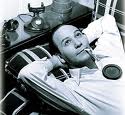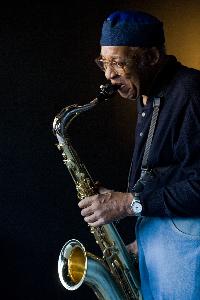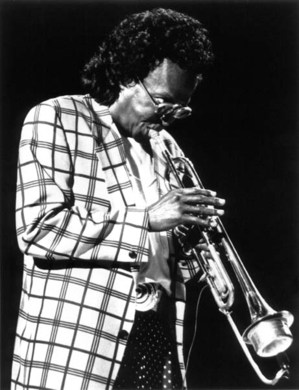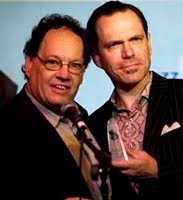main: June 2010 Archives
America's great vernacular songwriter Frank Loesser was born 100 years ago today. To celebrate, cable tv network TCM is showing the film of his Pulitzer Prize winning musical How to Succeed In Business Without Really Trying, and Neptune's Daughter which features Loesser's evergreen duet "Baby It's Cold Outside" (see and hear below, I hope -- much Loesser material seems to have been removed from Amazon today, after I linked to it). 

On the NPR show Fresh Air Michael Feinstein will talk about the Great Man and his lyrics + music. Guys anywhere may be whistling "Standing On The Corner Watching All The Girls Go By," while dolls are swooning to "If I Were A Bell." Gamblers will pray that "Luck Be A Lady Tonight," Danes might hum "Wonderful Copenhagen," NRA members proclaim "Praise the Lord and Pass the Ammunition," the lonely complain "They're Either Too Young Or Too Old," kid-cowpokes (are there still any?) boast "I've Got Spurs That Jingle Jangle Jingle" and nostalgic oldsters assert "Once In Love With Amy (Always In Love With Amy)." Loesser wrote something for everybody.
Continue reading Frank Loesser at 100.
As a teenager in pursuit of the avant garde, I took tenor saxophonist Fred Anderson, who died June 24 at age 81, as a hero upon first hearing him in 1966. It was at a Unitarian Church-run coffee house in downtown Evanston near Northwestern U., and attention clearly had to be paid to the long, fierce, unreeling, knotty improvisations Anderson delivered in an ever-more hunkered-down posture as the evening went on.

There was an unremitting sense of urgency, sincerity and humility to what he was saying on his horn, spelled by startling outbursts from his pained-looking trumpeter, Billy Brimfield, and support from some rhythmically free-flowing bass and drummer (I forget who). There was nothing showy about Fred, though he was a large man who wore a skullcap. He was old to me then -- 36 or 37. I bought Song For, Joseph Jarman's album brilliantly employing Anderson's standing band as soon as Delmark released it that year, too. I heard him many times in the 15 years that followed, at various concerts produced by the AACM (Association for the Advancement of Creative Musicians) of which he was a co-founder along with another of my musical heroes, Muhal Richard Abrams. Fred was never less than totally involved in what he was doing, which was forcing air through a bent tube to shake the earth we walked on and the culture we breathed. (Photo left by Jim Newberry, thanks to Thrill Jockey records.)
Continue reading Fred Anderson, Chicago jazz hero, appreciated.
Miles Davis is still at it -- in Prospect Park, the Highline Ballroom, (le) Poisson Rouge, Carefusion Jazz Festival's Carnegie Hall concerts, also overflowing the Montreal Museum of Fine Arts, as per my City Arts - New York column and enriching the glorious Festival International de Jazz de Montreal (June 25 - July 5).


Though he died of exacerbated living at age 65 in 1991, the influence of Miles' trumpet and his breakthrough "directions in music" vibrates through urbane international cultural as strongly now as ever. Bitches Brew, which launched a jazz-rock revolution, and Tutu, his most ambitious late-period album, are inspiring high visibility concert performances that are exciting in their own rights, unveiling a potential future rather than reviving the past.
This Miles wave isn't nostalgia-based: it's a wake-up call for a world short on sharp melodies, harmonic exploration, rampant rhythm, full-force interaction. Audiences I've encountered seem eager to hear again or for the first time Miles' many modes -- from aching fragility to hippest cool to surrealistic phantasmagoria to imperious swagger, all conveyed with surprising, original lyricism.
Continue reading Miles' beyond jazz, today and tomorrow.
Why give Jazz Awards? See my new column in City Arts re the event Monday 6/14 at City Winery in NYC, produced by the Jazz Journalists Assoc.
 (Full disclosure: I'm deeply involved -- as left, last year presenting Kurt Elling his statuette for Best Male Vocalist, photo by Enid Farber. See us this year, streaming live video online at www.JJAJazzAwards.org, with satellite parties in Albuquerque, Berkeley, Chicago, Portland, Seattle, Scottsdale, and tweeting using the hashtag #jjajazzawards)
(Full disclosure: I'm deeply involved -- as left, last year presenting Kurt Elling his statuette for Best Male Vocalist, photo by Enid Farber. See us this year, streaming live video online at www.JJAJazzAwards.org, with satellite parties in Albuquerque, Berkeley, Chicago, Portland, Seattle, Scottsdale, and tweeting using the hashtag #jjajazzawards)
Continue reading Why of the Jazz Journalists Assn's Jazz Awards.
Musicologists are convinced blues icon Robert Johnson's recordings as released are 20% faster than he performed in two solo sessions in 1936 and 1937. It's unclear whether they were sped up intentionally (to push their excitement, which seems hardly necessary) or accidentally at some point in the chain between microphone and pressing plant. What is obvious is that since only 11 of the 41 existent Johnson takes were issued by Vocalion on 78 rpm discs during his lifetime (and one posthumously), his complete documented repertoire of 29 tunes issued on two Columbia Records lps, King of the Delta Blues Singers (1961) and King of the Delta Blues Singers, Vol. 2 (1970) and finally 41 tracks, alternates and all, released on a best-selling 2-CD boxed set, Robert Johnson The Complete Recordings by Columbia in 1990, we have probably never heard what the blues' most influential singer-guitarist actually sounded like.
Continue reading Robert Johnson on speed.